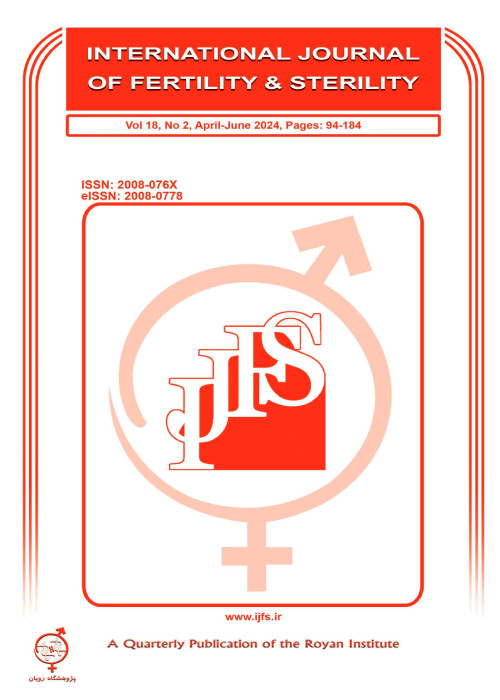ICSI Outcome in Infertile Couples with Different Causes of Infertility: A Cross-Sectional Study
Author(s):
Abstract:
Background
Different success rate of Intracytoplasmic Sperm injection (ICSI) has been observed in various causes of infertility. In this study, we evaluated the relation between ICSI outcome and different causes of infertility. We also aimed to examine parameters that might predict the pregnancy success rate following ICSI. Materials And Methods
This cross sectional study included1492 infertile women referred to Infertility Center of Royan Institute between 2010 and 2011. We assigned two groups including pregnant (n=504) and non-pregnant (n=988), while all participants underwent ICSI cycles. All statistics were performed by SPSS program. Statistical Analysis was carried out using Chi-square and t test. Logistic regression was done to build a prediction model in ICSI cycles. Results
The overall clinical pregnancy rate in our study was 33.9% (n=1492). There was a statistically significant difference in mean serum concentration on day 3 after application of luteinizing hormone (LH) between the pregnant and the non-pregnant groups (p<0.05). However, There were no significant differences between two groups in the serum concentrations on day 3 after application of the following hormones: folliclestimulating hormone (FSH), thyroid-stimulating hormone (TSH), and metoclopramidestimulated prolactin (PRL). We found no association between different causes of infertility and clinical outcomes. The number of metaphase II (MII) oocytes, embryo transfer, number of good embryo (grade A, B, AB), total dose of gonadotropin, endometrial thickness, maternal age, number of previous cycle were statistically significant between two groups (p<0.05). Conclusion
Our results indicate that ICSI in an effective option in couples with different causes of infertility. These variables were integrated into a statistical model to allow the prediction for the chance of pregnancy following ICSI cycles. It is required that each infertility center gather enough information about the causes of infertility in order to provide more information and better assistance to patients. Therefore, we suggest that physicians prepare adequate training and required information regarding these procedures for infertile couples in order to improve their knowledge.Keywords:
Language:
English
Published:
International Journal Of Fertility and Sterility, Volume:7 Issue: 2, Jul-Sep 2013
Page:
88
magiran.com/p1151265
دانلود و مطالعه متن این مقاله با یکی از روشهای زیر امکان پذیر است:
اشتراک شخصی
با عضویت و پرداخت آنلاین حق اشتراک یکساله به مبلغ 1,390,000ريال میتوانید 70 عنوان مطلب دانلود کنید!
اشتراک سازمانی
به کتابخانه دانشگاه یا محل کار خود پیشنهاد کنید تا اشتراک سازمانی این پایگاه را برای دسترسی نامحدود همه کاربران به متن مطالب تهیه نمایند!
توجه!
- حق عضویت دریافتی صرف حمایت از نشریات عضو و نگهداری، تکمیل و توسعه مگیران میشود.
- پرداخت حق اشتراک و دانلود مقالات اجازه بازنشر آن در سایر رسانههای چاپی و دیجیتال را به کاربر نمیدهد.
In order to view content subscription is required
Personal subscription
Subscribe magiran.com for 70 € euros via PayPal and download 70 articles during a year.
Organization subscription
Please contact us to subscribe your university or library for unlimited access!


